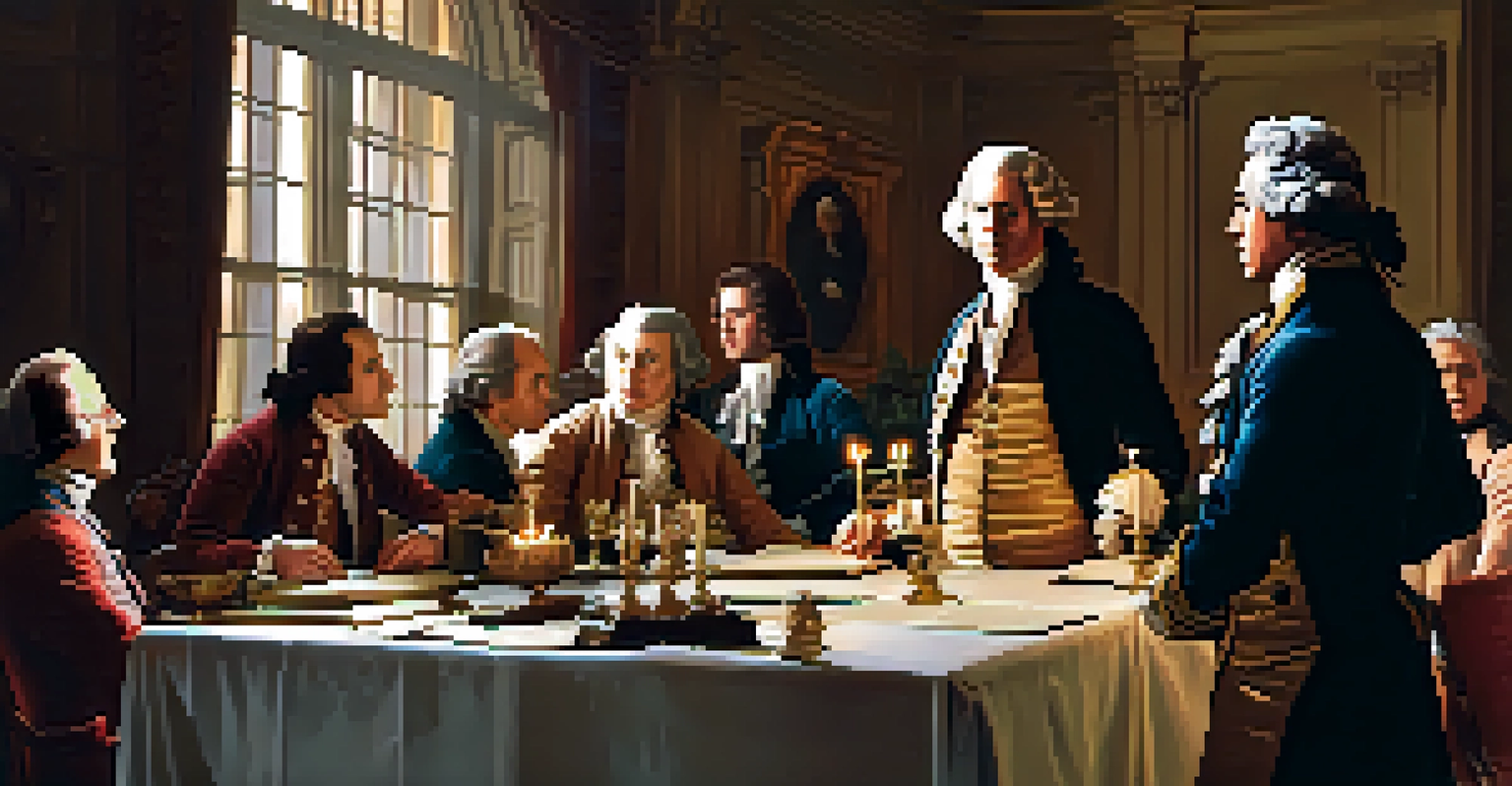Philadelphia's Role in Shaping Early American Governance

The Birthplace of American Democracy: Philadelphia's Significance
Philadelphia is often referred to as the birthplace of American democracy, and for good reason. In the late 18th century, the city became a melting pot of revolutionary ideas and discussions about governance. This vibrant atmosphere laid the groundwork for some of the most significant political events in American history.
The only thing necessary for the triumph of evil is for good men to do nothing.
The Pennsylvania State House, now known as Independence Hall, hosted the Continental Congress, where leaders convened to discuss the future of the colonies. It was here that the Declaration of Independence was debated and adopted in 1776, marking a pivotal moment in the fight for freedom.
Additionally, the city was the site of the Constitutional Convention in 1787, where the U.S. Constitution was drafted. This gathering of brilliant minds aimed to create a government that would balance power and protect individual rights, shaping the nation’s political landscape.
Key Figures in Philadelphia's Governance Evolution
Philadelphia was home to many influential figures who played crucial roles in shaping early governance. Leaders like Benjamin Franklin, who advocated for democracy and civic responsibility, helped to foster a spirit of collaboration and innovation. His ideas about public service and education laid the foundation for a more informed electorate.

Another key player was George Washington, who presided over the Constitutional Convention. His leadership and vision for a strong, united nation helped to guide the discussions that resulted in the Constitution, ensuring that it would withstand the test of time.
Philadelphia: Democracy's Birthplace
The city served as the backdrop for pivotal events like the Declaration of Independence and the Constitutional Convention, establishing its role as a cornerstone of American democracy.
Moreover, figures like James Madison and Alexander Hamilton, who later became known as the 'Founding Fathers,' contributed to establishing the Federalist Papers. This series of essays argued for ratification of the Constitution, illustrating the debates and philosophies that shaped the new government.
The Continental Congress: A Crucible of Governance
The Continental Congress, formed in 1774, was critical in uniting the colonies against British rule. Meeting in Philadelphia, it served as a platform for leaders to discuss grievances and coordinate resistance efforts. This collaborative approach marked a significant shift towards collective governance.
Injustice anywhere is a threat to justice everywhere.
During the Second Continental Congress, which began in 1775, delegates faced the monumental task of managing the war effort against Britain. They established the Continental Army and appointed George Washington as its commander, reflecting a move towards organized governance amidst chaos.
The Congress also adopted the Articles of Confederation in 1781, which served as the first constitution of the United States. While ultimately deemed ineffective, this document represented a crucial step in the evolution of governance, highlighting the challenges of uniting diverse states under a single framework.
Drafting the Constitution: Compromises and Innovations
The drafting of the U.S. Constitution in Philadelphia was a remarkable feat of political negotiation. Delegates arrived with differing visions for the new government, leading to intense debates and compromises. The Great Compromise, which established a bicameral legislature, was a pivotal moment in ensuring representation for both large and small states.
Another significant innovation was the introduction of checks and balances, aimed at preventing any one branch of government from becoming too powerful. This framework was revolutionary at the time and remains a cornerstone of American governance today.
Influential Leaders Shaping Governance
Figures such as Benjamin Franklin and George Washington played significant roles in the development of early American governance, fostering collaboration and innovation.
The outcome of the convention was a Constitution that balanced federal and state powers while protecting individual rights. The Bill of Rights, added shortly thereafter, ensured that citizens’ freedoms would be safeguarded, addressing concerns raised during the ratification debates.
The Influence of Enlightenment Ideas on Governance
The Enlightenment was a powerful intellectual movement that shaped the ideals of early American governance. Philosophers like John Locke and Montesquieu emphasized concepts such as natural rights, social contracts, and the separation of powers. These ideas resonated deeply with the Founding Fathers in Philadelphia.
Locke's belief in life, liberty, and property influenced the Declaration of Independence, while Montesquieu's advocacy for separation of powers was directly reflected in the Constitution. The Founding Fathers drew from these Enlightenment principles to create a government that was both innovative and rooted in philosophical thought.
This synthesis of Enlightenment ideas and practical governance showcased Philadelphia as a hub for revolutionary thinking. It transformed the city into a beacon of hope for those seeking freedom and democracy, leaving a lasting legacy on American political thought.
Philadelphia's Legacy in American Civic Engagement
Philadelphia's role in early governance set the stage for a strong tradition of civic engagement in the United States. The discussions and debates that took place in the city inspired future generations to participate actively in their government. This spirit of involvement is evident in the continued importance of town halls, public forums, and civic organizations.
The establishment of institutions like the American Philosophical Society fostered a culture of public discourse and intellectual exchange. These gatherings encouraged citizens to engage with political ideas and take an active role in shaping their communities.
Legacy of Civic Engagement
Philadelphia's historical commitment to democratic ideals continues to inspire active civic participation and public discourse among its residents today.
Today, Philadelphia remains a city known for its vibrant civic life, where residents are encouraged to voice their opinions and advocate for change. This ongoing engagement reflects the city’s historical commitment to democracy and the belief that every citizen has a role in governance.
Modern Implications of Philadelphia's Governance Foundations
Understanding Philadelphia's role in shaping early governance helps us appreciate the complexities of modern American politics. The foundational principles established during the 18th century continue to influence contemporary debates around democracy, representation, and rights. Citizens today are still grappling with the balance of power and the responsibilities of government.
Moreover, the city’s history serves as a reminder of the importance of compromise and collaboration in politics. As divisive as modern politics can be, the lessons learned from Philadelphia’s early gatherings emphasize the value of dialogue in finding common ground.

Finally, Philadelphia's legacy encourages ongoing reflection on the ideals of democracy and governance. As we face new challenges, the city’s historical significance reminds us that the pursuit of a more perfect union is a continuous journey, requiring the active participation of all citizens.